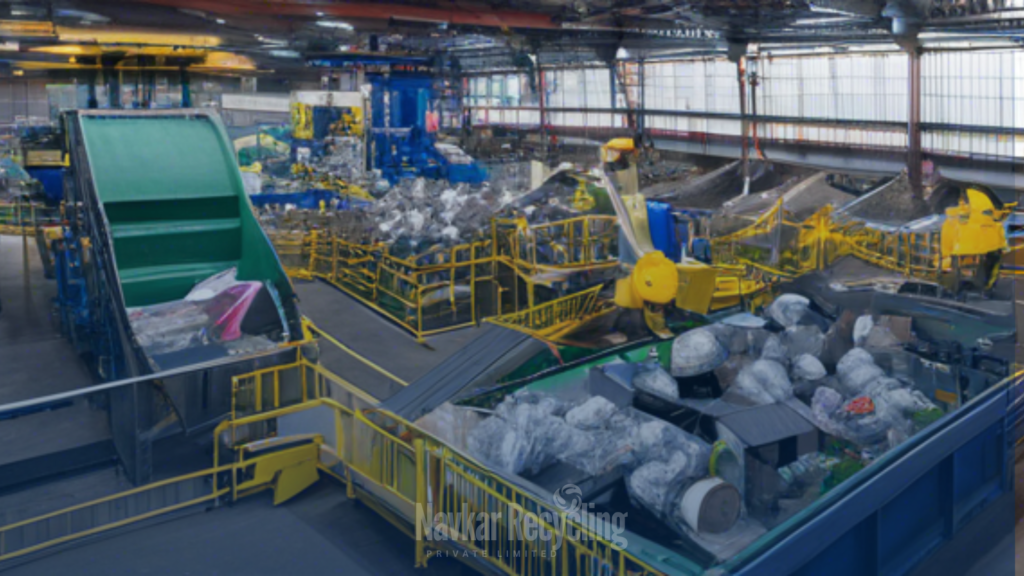
Recycling has come a long way from its origins of simply sorting bottles and cans. With growing environmental awareness and rapid technological advancements, the recycling industry is experiencing transformative changes. For businesses, policymakers, and individuals committed to sustainability, understanding these evolving trends and innovations is crucial. This blog post delves into the future of recycling, spotlighting key trends and innovations that are reshaping the industry, with a focus on how Navkar Recycling is at the forefront of these developments.
1. Advanced Recycling Technologies
One of the most notable trends in recycling is the advancement of technology. Navkar Recycling is leading the way with several innovative improvements that enhance the efficacy and efficiency of recycling operations:
- Automated Sorting Systems: At Navkar Recycling, modern facilities are equipped with automated systems that utilize artificial intelligence (AI) and machine learning. These systems accurately identify and sort various materials, improving the quality of recycled materials and minimizing contamination. This includes specialized recycling for materials such as ferrous and non-ferrous metals.
- Chemical Recycling: Unlike traditional mechanical recycling, chemical recycling at Navkar Recycling breaks down plastics into their basic chemical components. This process handles materials that are typically difficult to manage, such as mixed or contaminated plastics, and produces high-quality, reusable raw materials. This approach is crucial for effective EPR plastic waste management.
- Robotic Sorting: Navkar Recycling employs advanced robots equipped with sensors and AI algorithms to sort recyclables more efficiently. These robots can handle a wide array of materials and adapt to changes in waste composition, enhancing recycling operations, including Li-ion recycling and lead-acid battery recycling.
2. Circular Economy Models
The concept of a circular economy is gaining momentum as a sustainable development framework. Navkar Recycling supports this shift by emphasizing resource recycling and continuous use over the conventional linear economy. Key elements include:
- Product Design for Longevity: Navkar Recycling advocates for product designs that emphasize durability and recyclability. This reduces waste and ensures that products can be easily repaired, refurbished, or recycled at the end of their lifecycle. This principle supports carbon footprint reduction services and efficient recycling practices.
- Take-Back Programs: Navkar Recycling collaborates with businesses to implement take-back programs that encourage consumers to return used products for recycling or refurbishment. These programs help close the loop by ensuring products are recycled or repurposed rather than ending up in landfills. This is particularly relevant for IT and electronics assets disposition (ITAD) and e-waste management.
- Material Recovery Facilities (MRFs): Our MRFs are evolving to support the circular economy by focusing on maximizing material recovery and minimizing waste. They are equipped to handle a broader range of materials and use advanced sorting technologies to improve recycling rates.
3. Increased Focus on E-Waste Recycling
The growing volume of electronic waste (e-waste) poses significant challenges. Addressing e-waste recycling is a priority for Navkar Recycling:
- Specialized E-Waste Facilities: Navkar Recycling has established dedicated facilities to handle the complex recycling processes required for e-waste. These facilities use advanced technologies to safely extract valuable materials, such as rare earth metals, from electronic devices. This includes data destruction and hazardous waste management.
- Regulatory Changes: We stay abreast of and comply with stricter regulations and standards for e-waste management introduced by governments and regulatory bodies. In line with EPR compliance, these regulations seek to lessen the negative effects of e-waste on the environment and to guarantee appropriate disposal and recycling procedures.
- Consumer Awareness Campaigns: Navkar Recycling supports educational initiatives that raise awareness about the importance of e-waste recycling. These campaigns encourage consumers to properly dispose of their old electronics and participate in recycling programs.
4. Integration of Blockchain Technology
Blockchain technology is becoming more and more prevalent in the recycling industry. It is most commonly associated with cryptocurrency. Navkar Recycling is exploring its potential benefits:
- Transparency and Traceability: Blockchain provides a transparent and immutable record of recycling processes, from collection to final disposal. This traceability ensures responsible handling of materials and reduces the risk of fraud. This technology supports reverse logistics and data integrity in recycling operations.
- Smart Contracts: Navkar Recycling utilizes blockchain-based smart contracts to automate and enforce recycling agreements and transactions. This automation reduces administrative overhead and enhances efficiency in the recycling supply chain.
5. Community and Corporate Initiatives
Community and corporate initiatives play a crucial role in advancing recycling efforts, and Navkar Recycling is actively involved in these areas:
- Corporate Sustainability Programs: Many companies, in partnership with Navkar Recycling, are launching sustainability programs with ambitious recycling goals. These programs often involve collaborations with recycling organizations and investments in recycling technologies, including upcycling and specialized recycling.
- Community-Based Recycling Projects: Navkar Recycling supports innovative local recycling projects, such as neighborhood recycling hubs and educational workshops. These initiatives engage residents and promote active participation in recycling efforts.
Discover How Navkar Recycling is Leading the Future of Recycling
Discover how Navkar Recycling, a premier e-waste recycler in India is transforming the future of recycling through cutting-edge technologies and sustainable practices. Learn more about our innovative solutions and how you can join us in this movement towards a greener planet.
Conclusion
The future of recycling is being shaped by advanced technologies, circular economy models, and a heightened focus on specific waste streams like e-waste. As the industry evolves, embracing these trends and innovations will be essential for achieving higher recycling rates and reducing environmental impact. Navkar Recycling is committed to staying at the forefront of these advancements, helping businesses, policymakers, and individuals contribute to a more sustainable and circular future.
